“This place is my destiny”, reflecting on a lifetime in Ghanaian society, learning and playing music, and coming to terms with inter-cultural relationships.
Music, says John, is a communion between players and audience or a meditation, not a way to get rich quick.
Despite not being religious he sees the separatist churches in Ghana as benign, in contrast to the history of the multinational corporation known as the Catholic Church.
Once upon a time only Palm Wine drunkards played guitar, times changed and now John teaches Ghanaian popular music at the University of Accra.
The archive of Highlife music at his house survived a flood and records a lifetime of musical evolution.
Love and other inter-cultural misunderstandings in Ghana. The Prisma keeps talking to Collins.
Were you still playing?
I never stopped, and in 1998 I formed a new band called Local Dimension with the multi-instrumentalist Aaron Bebe Sukrua, and a lot of top musicians have played with us. But I also use guitar playing as a form of prayer.
I play poly-rhythmically with the guitar and harmonica at the same time, and through this you can lose your sense of Ego.
If you play in a group you have the experience of being among a family of musicians, a communion, and if you play for a live audience who are dancing, you’ve got everything you need in the world! I can’t understand what satisfaction the modern techno-pop musicians get apart from the act of composition.
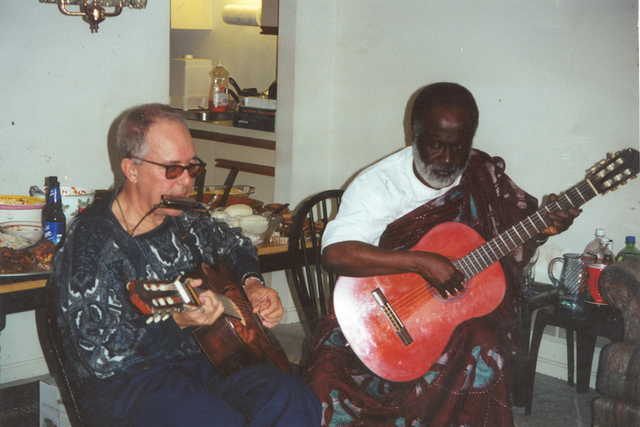
They seem to simply want to become rich and famous fast. Koonimo, who’s a musician and a philosopher from Kumasi, says “fame is a vapour”. The instrument itself should give you happiness, then playing in a group gives you more and finally a dancing, participating audience, it is like a communion of yourself with your family and your extended family.
Someone I met recently said she does not like modern Ghanaian music because the songs do not have a story.
Traditional African music could have multiple meanings, and contain parables about the community and a philosophy of life. Hip-Life has gone back to this idea of social commentaries to some extent, but a lot of modern Ghanaian rap is mainly about money, fast cars and fame: Gangsta Rap.
Would Africans describe their music like that?
Contemporary music is individualistic but traditional music was a communal thing, because Africa is based on communalism, not communism. In fact if you became too egoistic or powerful, outside of the Chieftaincy system where you climbed the hierarchy, you were traditionally called a witch.
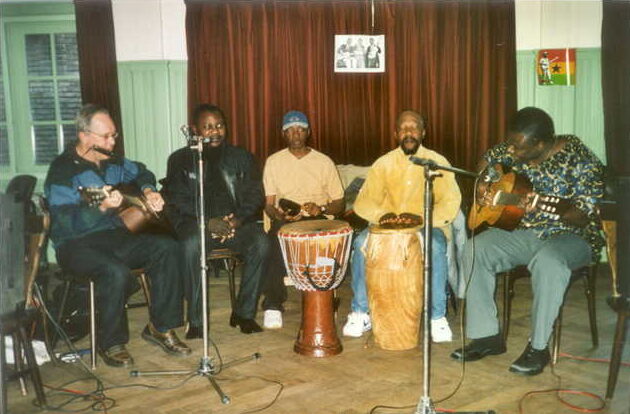 Europeans encouraged modern class stratification and individualism, capitalist divisions between rich and poor, the breaking up of families through some member becoming fabulously wealthy and not wanting to share.
Europeans encouraged modern class stratification and individualism, capitalist divisions between rich and poor, the breaking up of families through some member becoming fabulously wealthy and not wanting to share.
The major themes in Highlife music in the 1950’s were witchcraft accusations in the family, inheritance disputes, broken homes and orphans.
This all had to happen because of the western notion of capitalist progress and the need for social mobility and the nuclear family. Rather than eliminating witchcraft Europeans actually encouraged it.
Why is the church important in Ghana?
Because there was so much ‘witchcraft’ around in the 20th century Africans had to set up anti-witchcraft shrines led by ‘witch doctors’ to deal with this modern anxiety through spiritual purification. In the last 50 years or so however, spiritual healing and prospering have become a major function of the separatist African Christian churches.
They are concerned with prosperity now not in the afterlife, which is an extension of the idea of fertility cult. In the old days you prayed to the gods for a good harvest, a strong prick and lots of children.
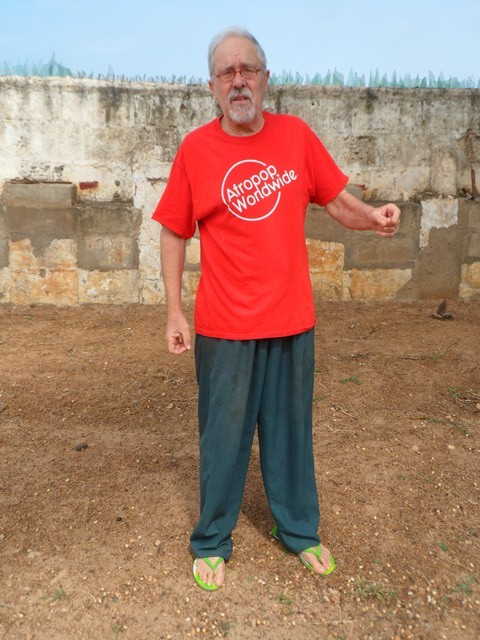 I do not think Christ was preaching an other-worldly a religion that encouraged people to have a miserable life, otherwise he wouldn’t have turned water into wine or had good food at the last supper. Christianity was distorted when it became the official Roman religion.
I do not think Christ was preaching an other-worldly a religion that encouraged people to have a miserable life, otherwise he wouldn’t have turned water into wine or had good food at the last supper. Christianity was distorted when it became the official Roman religion.
The Missionaries even tried -and failed- to stop Ghanaians from dancing in services, which was part of their schizophrenic attitude to the mind and the body, born into original sin and of a woman who are supposedlyevil. If you are not baptized you go to hell. African children are traditionally ‘outdoored’ on the 8th day after birth, and until then they are a divinity. If they die before that they go back to the stars, not to hell. This also protected women from a lot of grief in those days when infant mortality was high, because the child was a ‘Starchild’.
To an African the world is not evil, African Christianity is benign. As Karl Marx said, religion ‘brings the heart to a heartless world’, (in the full ‘opium of the people’ quotation). The ‘heart’ of traditional religion (dancing, spiritual healing, miracles, fertility/ prosperity message) is still strong in African Christianity. Dislike of sex and woman (the temptress) is one reason for the Catholic custom of celibate priests. But another was that if a priest had children they would inherit part of the wealth that would have gone to the church. So the Catholic Church was able to amass wealth -and after hundreds of years they can’t let go- which has led to the sexual abuses found in the church today. Now that the Catholic Church is a rich multinational corporation they could allow priests to marry, have a natural sex life and have children and their problems of sexual abuse would evaporate.
We got to about 1994?
Yes it was that year I got my Ph D and then in 1995 the University of Ghana brought me in to develop African Popular music studies.
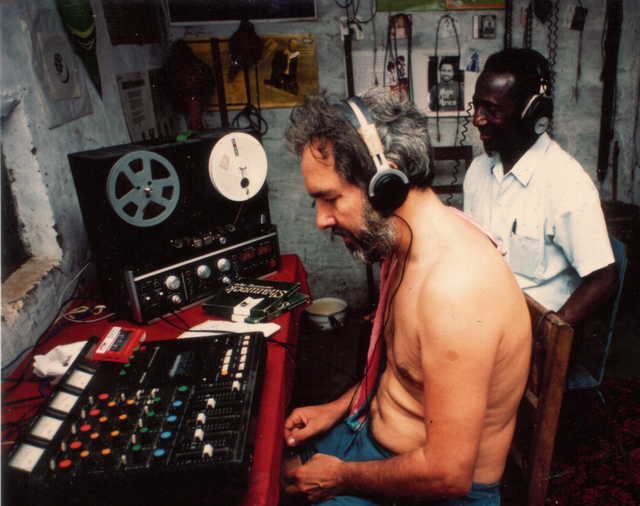 In the Nkrumah period African traditional music was studied alongside western classical music, but popular music had been left out because Nkrumah was overthrown. I was also there to open up guitar teaching, following in the footsteps of Kwaa Mensah. The local Palmwine guitar style had been associated with drunkards and loose living. But things changed as the churches started using guitars. Some people wanted me to teach classical guitar, but I refused, as I’d been taught Palmwine guitar by people like Kwaa Mensah and Koo Nimo, who were the equivalents of Leadbelly or Robert Johnson in US Blues.
In the Nkrumah period African traditional music was studied alongside western classical music, but popular music had been left out because Nkrumah was overthrown. I was also there to open up guitar teaching, following in the footsteps of Kwaa Mensah. The local Palmwine guitar style had been associated with drunkards and loose living. But things changed as the churches started using guitars. Some people wanted me to teach classical guitar, but I refused, as I’d been taught Palmwine guitar by people like Kwaa Mensah and Koo Nimo, who were the equivalents of Leadbelly or Robert Johnson in US Blues.
You set up the Bapmaf archives in 1990
That was accidental too, I’d been collecting music, photos, books and magazines for years, then in the late 1980’s a number of us older Ghanaian highlife musicians got seriously concerned after the music scene collapsed during military period. So we established the Bokoor African Popular Music Archives Foundation (BAPMAF) to preserve and promote Highlife music
The first people who showed interest in our project were the German Goethe Institute who organised a month-long Highlife Festival in 1996 of films, photographs and concerts.
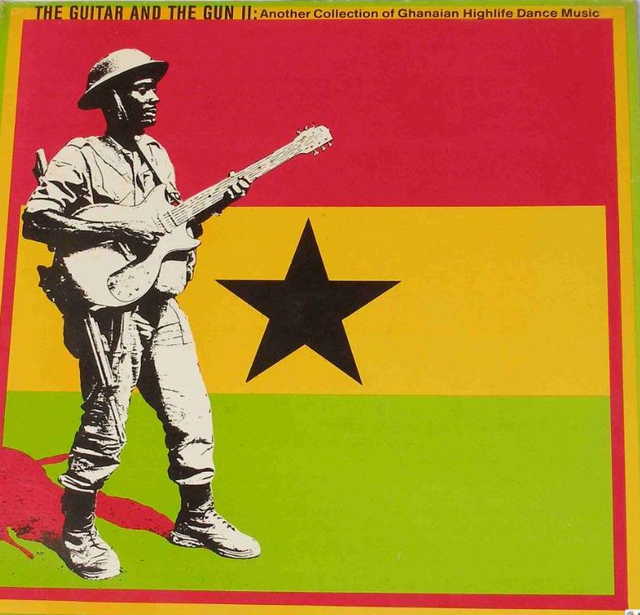 They also gave me equipment to digitize most of the recordings photos and documents. But in 2011 there was a flood at my house. I lost 500 tapes, all my recording equipment, and my car -about 40,000 dollars. But the Prinz Claus Foundation in Holland gave me money to build dams and dykes around my BAPMAF property- so I’m an honorary Dutchman now! The flood was man-made. The sawmill nearby had been dumping waste sawdust into the local streams for years. So water built up until it burst and a six-foot Tsunami swept down the valley. My family had been sleeping downstairs and were lucky to survive.
They also gave me equipment to digitize most of the recordings photos and documents. But in 2011 there was a flood at my house. I lost 500 tapes, all my recording equipment, and my car -about 40,000 dollars. But the Prinz Claus Foundation in Holland gave me money to build dams and dykes around my BAPMAF property- so I’m an honorary Dutchman now! The flood was man-made. The sawmill nearby had been dumping waste sawdust into the local streams for years. So water built up until it burst and a six-foot Tsunami swept down the valley. My family had been sleeping downstairs and were lucky to survive.
Do you see yourself as Ghanaian?
This place is my destiny and I say that deliberately. I’m not religious but I don’t disregard mystical forces. I have had many signs here, marvellous coincidences. In the UK that might happen once a year, here it’s 3 times a week. Maybe because it’s like a village here and the energy you put out comes back. And in Ghana I’ve played music with soldiers and fishermen, moved with hunters and traditional chiefs, lived in mud huts, met Victorian-like elites and Ministers of State. OK, a foreigner has more mobility than local people but if I had stayed in the UK I’d have probably married a university girl with the same opinions as me and got stuck in a middle-class rut. There are problems here of course, intercultural friendship can be a big challenge.
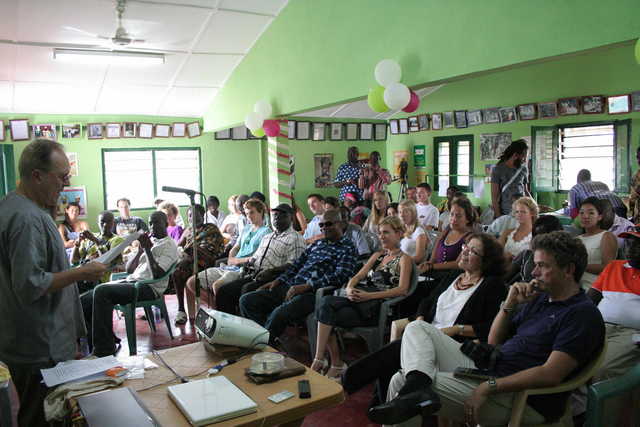
How do you mean?
Among the generation I grew up with in Ghana there was not much (except amongst the westernised elites) idea of romantic love as the basis of marriage. Marriage was an alliance between families, the husband was obliged to set his wife up in business, so she has economic independence and then contributes to supporting the children. In fact women are so highly regarded here economically that you have to pay your wife’s family a ‘bride-price’. The colonialists tried to say this was buying a woman as a slave, completely missing the point. This is the opposite to the traditional European dowry system where the wife’s family had to pay the husband’s family to get rid of an economically ‘useless’ women, who became subservient to her husband.
It often seems to tourists who get involved with Africans that all they want is money.
People here express their love with gifts or money. Money here is a gift. If you give woman money in the West it makes her a prostitute.
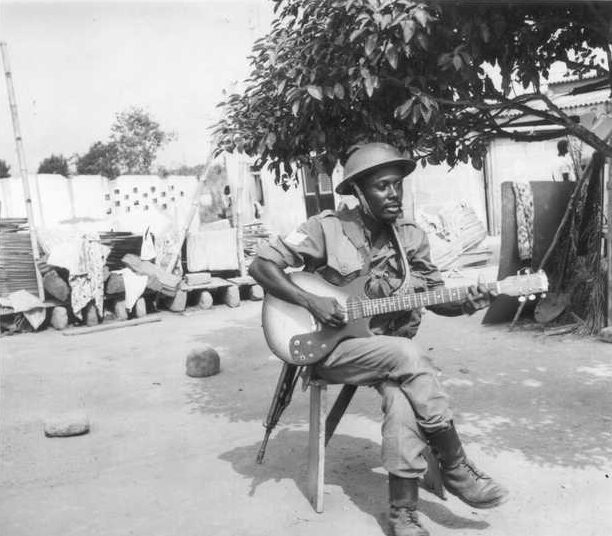
This is because westerners idealize romantic love and platonic friendships, and see them as corrupted by money. But the West has long been deeply corrupted by money, capitalism, and the ‘filthy lucre’, so it tries to isolate certain deep romanticised relationships from the cash nexus. But that is a western problem. Here money was simply a form of gift exchange that did not pollute but rather express deep relationships.
(Photos supplied by the interviewee and authorised for publication.)

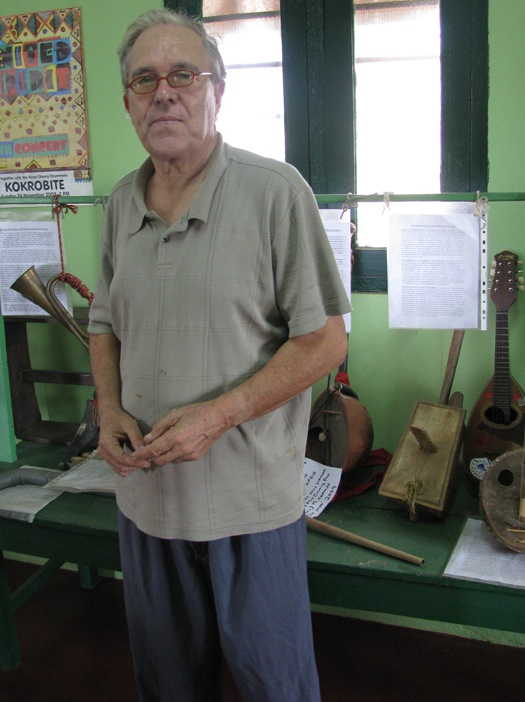











.jpg)












